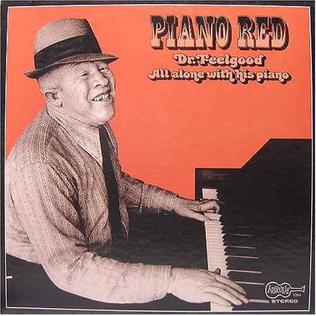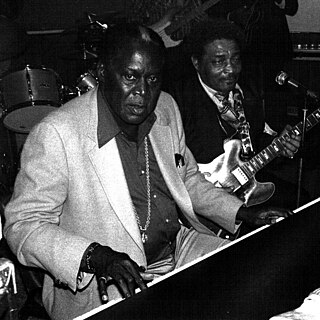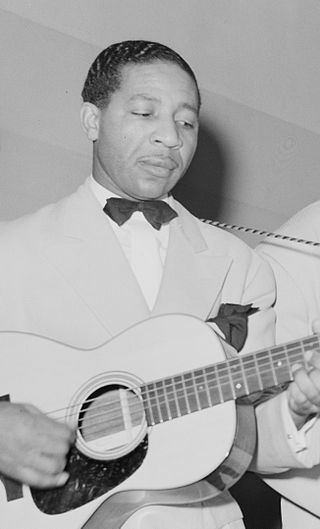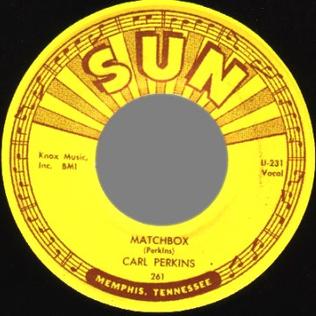Related Research Articles

Willie Lee Perryman, usually known professionally as Piano Red and later in life as Dr. Feelgood, was an American blues musician, the first to hit the pop music charts. He was a self-taught pianist who played in the barrelhouse blues style. His performing and recording careers emerged during the period of transition from completely segregated "race music" to rhythm and blues, which was marketed to both white and black audiences. Some music historians credit Perryman's 1950 recording "Rocking With Red" for the popularization of the term rock and roll in Atlanta. His simple, hard-pounding left hand and his percussive right hand, coupled with his cheerful shout, brought him considerable success over three decades.

John Len Chatman, known professionally as Memphis Slim, was an American blues pianist, singer, and composer. He led a series of bands that, reflecting the popular appeal of jump blues, included saxophones, bass, drums, and piano. A song he first cut in 1947, "Every Day I Have the Blues", has become a blues standard, recorded by many other artists. He made over 500 recordings.

Harold "Chuck" Willis was an American blues, rhythm and blues, and rock and roll singer and songwriter. His biggest hits, "C. C. Rider" (1957) and "What Am I Living For" (1958), both reached No.1 on the Billboard R&B chart. He was known as The King of the Stroll for his performance of the 1950s dance the stroll.

Lawrence Eugene Williams was an American rhythm and blues and rock and roll singer, songwriter, and pianist from New Orleans. He is best known for writing and recording some rock and roll classics from 1957 to 1959 for Specialty Records, including "Bony Moronie", "Short Fat Fannie", "Slow Down", "Dizzy, Miss Lizzy" (1958), "Bad Boy" and "She Said Yeah" (1959). John Lennon was a fan, and the Beatles and several other British Invasion groups recorded several of his songs.

Alonzo "Lonnie" Johnson was an American blues and jazz singer, guitarist, violinist and songwriter. He was a pioneer of jazz guitar and jazz violin and is recognized as the first to play an electrically amplified violin.
"Mr. Moonlight" is a song written by Roy Lee Johnson and recorded by Dr. Feelgood and the Interns in 1962. The song was covered by the Beatles on their 1964 albums Beatles for Sale and Beatles '65.

"Matchbox" is a song written and recorded by Carl Perkins and released in 1957. Blind Lemon Jefferson wrote and recorded a song entitled "Match Box Blues" in 1927, which is musically different but which contains some lyric phrases in common.

The Kentucky Headhunters are an American country rock and Southern rock band originating in the state of Kentucky. The band's members are Doug Phelps, Greg Martin, and brothers Richard Young and Fred Young. It was founded in 1968 as Itchy Brother, which consisted of the Young brothers and Martin, along with Anthony Kenney on bass guitar and vocals. Itchy Brother performed until 1982, with James Harrison replacing Martin from 1973 to 1976. The Youngs and Martin began performing as The Kentucky Headhunters in 1986, adding brothers Ricky Lee Phelps and Doug Phelps to the membership.
Beverly "Guitar" Watkins was an American blues guitarist. Sandra Pointer-Jones wrote, "Beverly Watkins is a pyrotechnic guitar maven whose searing, ballistic attacks on the guitar have become allegorical tales within the blues community." George Varga, reviewing her debut CD, observed that Watkins “sings and plays with enough poise and verve to make musicians half her age or younger consider alternative means of employment.”

"Rollin' and Tumblin'" is a blues standard first recorded by American singer-guitarist Hambone Willie Newbern in 1929. Called a "great Delta blues classic", it has been interpreted by hundreds of Delta and Chicago blues artists, including well-known recordings by Muddy Waters. Rock musicians usually follow Waters' versions, with the 1960s group Cream's rendition being perhaps the best known.

Edward Anthony Ashton was an English rock pianist, keyboardist, singer, composer, producer and artist.
"Crawling King Snake" is a blues song that has been recorded by numerous blues and other artists. It is believed to have originated as a Delta blues in the 1920s and be related to earlier songs, such as "Black Snake Blues" by Victoria Spivey and "Black Snake Moan" by Blind Lemon Jefferson.

"Key to the Highway" is a blues standard that has been performed and recorded by several blues and other artists. Blues pianist Charlie Segar first recorded the song in 1940. Jazz Gillum and Big Bill Broonzy followed with recordings in 1940 and 1941, using an arrangement that has become the standard.

"Forty-Four" or "44 Blues" is a blues standard whose origins have been traced back to early 1920s Louisiana. However, it was Roosevelt Sykes, who provided the lyrics and first recorded it in 1929, that helped popularize the song. "Forty-Four," through numerous adaptations and recordings, remains in the blues lexicon eighty years later.
Titus Lee Turner was an American R&B and East Coast blues singer and songwriter. His best-remembered recordings are "We Told You Not to Marry" and "Sound-Off". He also wrote "Leave My Kitten Alone", "Sticks and Stones" and "Tell Me Why".

Blues from the Apple, released in 1974 by Oblivion Records, is the only album under the leadership of guitarist and vocalist Charles Walker. Featured players include New York City based musicians Lee Roy Little, Bill Dicey (harmonica), 'Foxy' Ann Yancey, Larry Johnson (harmonica), Tom Pomposello, Bobby King, and Ola Mae Dixon (drums), among others.

The Smithsonian Collection of Classic Jazz is a six-LP box set released in 1973 by the Smithsonian Institution. Compiled by jazz critic, scholar, and historian Martin Williams, the album included tracks from over a dozen record labels spanning several decades and genres of American jazz, from ragtime and big band to post-bop and free jazz.

"Moanin' at Midnight" is a blues song written and recorded by Howlin' Wolf in 1951. The recording was released on Chess Records as his debut single. It charted on Billboard's R&B chart, but the B-side, "How Many More Years," became the popular side of the record.

James Faye "Roy" Hall, also known by his pseudonym "Sunny David", was an American rockabilly pianist and songwriter. Hall was an uncredited co-writer of the rockabilly classic "Whole Lotta Shakin' Goin' On", a song recorded by Hall himself and later popularized by Jerry Lee Lewis. Although his writing claim was initially disputed, later reissues of the song credit Hall for his role in its conception.

Albert White is an American blues guitarist, singer and songwriter. He has released two albums in his own name, although his musical career started in the late 1950s, when he played in Piano Red's then ensemble, later known as Dr. Feelgood & the Interns.
References
- ↑ "Music at Home: Behind the British Invasion". Yahoo.com.
- 1 2 3 4 Martin Goggin, The Story of 'Mr Moonlight', Roy Lee Johnson, Juke Blues no.59, 2005, pp.16-23
- ↑ Jaap Hindricks, letter in Juke Blues no. 60, 2006, p. 15, correcting earlier article
- 1 2 3 "ROY LEE JOHNSON : Sir Shambling's Deep Soul Heaven". Sirshambling.com. Retrieved 7 March 2019.
- ↑ Cub Koda . "When a Guitar Plays the Blues - Roy Lee Johnson" at AllMusic . Retrieved February 6, 2019.